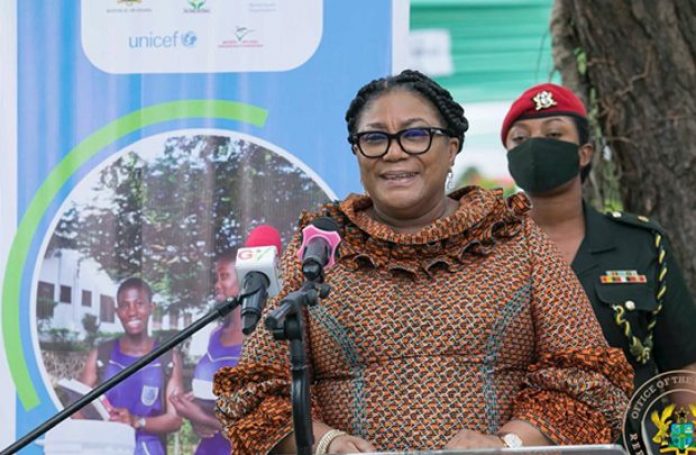The First Lady, Mrs. Rebecca Akufo-Addo, has made a clarion call for stakeholders to take action towards ending children dying from malnutrition, malaria, or other preventable illness in Ghana.
She said the COVID-19 pandemic had increased the current nutrition crisis due to the disruption in the food supply system, hence the need to fast-track actions to salvage the situation.
Mrs. Akufo-Addo was speaking at the Nutrition Advocate Event which brought stakeholders together to deliberate on improving the nutrition, health, survival, and development of women.
The First Lady commended the good initiative from the health sector “Start Right Feed Right” campaign that has helped to improve the quality of children’s diet to keep the country on the path to meeting the global nutrition targets.
She pledged her support to work towards achieving the Sustainable Development Goals (SDGs) by ensuring the decline in the prevalence of malnutrition and its resultant ill-health and death among children.
“I wish to restate my resolve that, no child should die from malnutrition, malaria, or other preventable illness in Ghana. So together with Malaria Prevention Foundation, our partners, and stakeholders, I stand committed to the task that is ahead of us,” she said.
She, again, urged all stakeholders to help in the strengthening of school-based interventions like the provision of safe potable water, health, nutrition, hygiene, and infection prevention education.
Minister of Health, Kwaku Agyeman-Manu, in his remarks, said in order for the country to achieve its objective of Universal Health Coverage (UHC) which is Goal three of the SDGs and other equally important goals, the government is ensuring a robust health insurance system, strengthening the implementation of policies such as the free maternal health care services to benefit women and children largely and by extension the entire population.
“We do recognise that the determinants of maternal and child health and nutrition are complicated and delivering on our set goals is beyond what the government alone can do, collaboration with other stakeholders and the traditional and community leaders is critical to success,” he said.
Mr. Agyeman-Manu stressed that the country’s national response has been to focus on scaling up cost-effective interventions, innovations, improved accountability and governance, advocacy, and health system strengthening.
“Government is working tirelessly to ensure equitable distribution of a competent health workforce and improve the health infrastructure,” he added.
Director-General, Ghana Health Service, Dr. Patrick Kuma-Aboagye, indicated that the country’s Maternal Child Health and Nutrition situation had evolved over the years, evidently showing in the incremental improvement recorded with regards to access and quality of health services, particularly for mothers, children, and adolescents.
By Jamila Akweley Okertchiri











